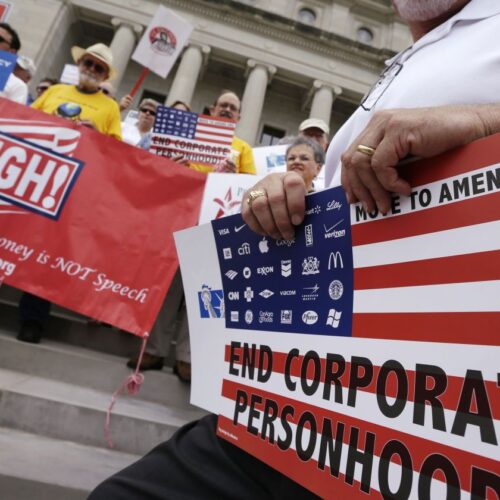Introduction
>> Read all the Center for Public Integrity’s investigations on money and democracy.
By now most folks know that the U.S. Supreme Court did something that changed how money can be spent in elections and by whom, but what happened and why should you care?
The Citizens United ruling, released in January 2010, tossed out the corporate and union ban on making independent expenditures and financing electioneering communications. It gave corporations and unions the green light to spend unlimited sums on ads and other political tools, calling for the election or defeat of individual candidates.
In a nutshell, the high court’s 5-4 decision said that it is OK for corporations and labor unions to spend as much as they want to convince people to vote for or against a candidate.
The decision did not affect contributions. It is still illegal for companies and labor unions to give money directly to candidates for federal office. The court said that because these funds were not being spent in coordination with a campaign, they “do not give rise to corruption or the appearance of corruption.”
>> Study: Most Americans want to kill ‘Citizens United’ with constitutional amendment
So if the decision was about spending, why has so much been written about contributions? Like seven and eight-figure donations from people like casino magnate and billionaire Sheldon Adelson who, with his family, has given about $40 million to so-called “super PACs,” formed in the wake of the decision?
For that, we need to look at another court case — SpeechNow.org v. FEC. The lower-court case used the Citizens United case as precedent when it said that limits on contributions to groups that make independent expenditures are unconstitutional.
And that’s what led to the creation of the super PACs, which act as shadow political parties. They accept unlimited donations from billionaires, corporations and unions and use it to buy advertising, most of it negative.
>> How slamming campaign finance laws helped Greg Gianforte get elected
The Supreme Court kept limits on disclosure in place, and super PACs are required to report regularly on who their donors are. The same can’t be said for “social welfare” groups and some other nonprofits, like business leagues.
These groups can function the same way as super PACs, so long as election activity is not their primary activity. But unlike the super PACs, nonprofits do not report who funds them. That’s disturbing to those who favor transparency in elections. An attempt by Congress to pass a law requiring disclosure was blocked by Republican lawmakers.
The Citizens United decision was surprising given the sensitivity regarding corporate and union money being used to influence a federal election. Congress first banned corporations from funding federal campaigns in 1907 with the Tillman Act. In 1947, the Taft-Hartley Act extended the ban to labor unions. But the laws were weak and tough to enforce.
It wasn’t until 1971 that Congress got serious and passed the Federal Election Campaign Act, which required the full reporting of campaign contributions and expenditures. It limited spending on media advertisements. But that portion of the law was ruled unconstitutional — and that actually opened the door for the Citizens United decision.
Spending is speech, and is therefore protected by the Constitution — even if the speaker is a corporation.
So far in the 2011-2012 election cycle, super PACs have spent $378 million, while non-disclosing nonprofits have spent $171 million, at times praising, but mostly badmouthing candidates, according to figures compiled by the Center for Responsive Politics.
See: Analysis: How might the ‘Citizens United’ decision be undone
READ MORE:
Conservative ‘dark money’ group faces IRS complaint over tax filings
A super PAC has raised millions to mobilize black voters. Does it matter that its funders are white?
Read more in Money and Democracy
Money and Democracy
Daily Disclosure: Mystery group spends $1 million opposing Obama
‘Citizen Awareness Project’ based in Colorado
Money and Democracy
Stealth spending on the rise as 2012 election approaches
Overwhelming percentage of interest group spending on negative ads


Join the conversation
Show Comments